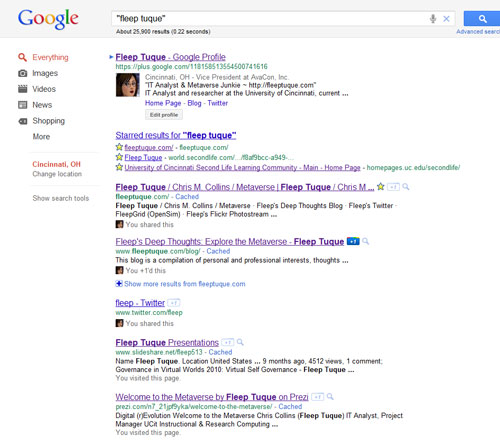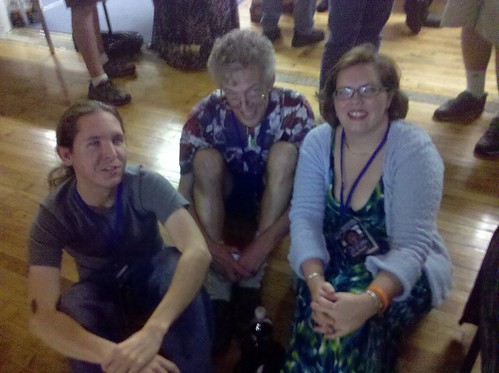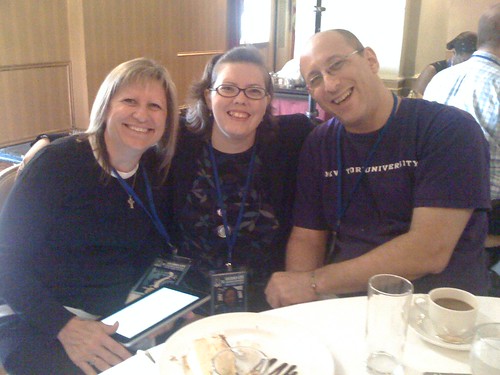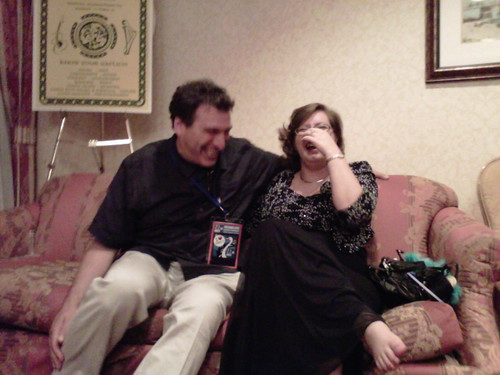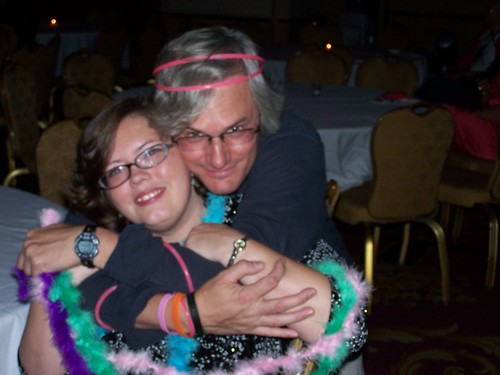I have to say, I’ve been really.. surprised and overwhelmed by the response to my previous post about why there wasn’t a Second Life Community Convention this year.
I was afraid I’d get chewed out from here to kingdom come, but the responses have been far more thoughtful, reflective, kind, and understanding than I expected, and I’m really grateful for that. Â I just want to say thank you to everyone who replied, who offered sympathy for my kitty, and for the kindness and care I saw not just in the comments on my blog, but in other places too. Â It did my heart some good, and I really, really appreciate that. I’m sure the other organizers do as well.
I thought I’d try to address some of the specific questions and comments both on my own post and from the conversations I see taking place elsewhere. Â Again, I’ll repeat my disclaimer from before – this is purely my own opinion / interpretation / understanding of events, and doesn’t represent the position or opinion of AvaCon or the Board or any other organization or person I work with. Â I didn’t consult with anyone else in writing this and my goal is to provide the Second Life community with some fair comment and criticism about the state of our user-based community convention.
About AvaCon’s Silence on the Problems
In my original post, I was obviously in a sort of “vent” mode, all these pent-up things came pouring out when I started writing and it was like the dam breaking. But please don’t think that I feel like I or AvaCon are completely blameless. Â We made mistakes, for sure. Â To be fair, the mistakes we made were largely innocent ones, the things you don’t figure out until you learn the hard way. Â But of all of our mistakes, I feel like our biggest was in not better communicating some of these problems sooner.
Crap Mariner’s comment I think is a fair one, from Ciarian Laval’s post SLCC 2012 Looks Like It Will be Just Like Blizzcon 2012:
AvaCon and its people are all good folks, meaning well, and tried really hard to make it work, but they were screwed by the Lab at every turn, didn’t want to admit it or give up, tried to deal with increasingly bizarre and decreasingly supportive behavior and terms, and in the end were doomed by their own enthusiasm or refusal to give up on the Lab… all in silence and no communication with the people they were wanting to serve while calling for volunteer.
If only we had known, would we have shouted at the Lab to put up or shut up?
I guess all I can say is, it’s not that we didn’t want to communicate what was going on, but that we inherited something of a PR nightmare when we took the convention over, and our initial strategy was to hunker down and just try to do a good job.  I do not want to get all critical of The Future United folks, this organizing community conventions gig is a very complicated, very difficult, very thankless job for whoever does it, and I’m sure just like us, they did the best they could with the resources they had.  But I think it would be fair to say that by the time we (AvaCon) came into the picture, tensions were very very high and there was already a lot of resentment, anger, personal politics, and all sorts of fraught relationships between the convention and the community already.
At the time, we thought the best way to turn that ship around – given our lack of  financial resources and the short time frame – was to keep the format simple and try to execute it as flawlessly as possible.  Instead of getting mired in flamewars on SLuniverse, or endless dithering about which city, and who what when, we made some executive decisions based on our previous experience as track leaders and volunteers.  The hope was, if we could try to rise above some of the ugliness and get a couple years of not fancy or spectacular conventions, but _successful_ ones under our belt – to show the community that we were capable partners, trustworthy, and well meaning – then that would give us a foundation to build on.
That was the hope. Â Obviously for many reasons, things didn’t turn out quite that way, and for that, I really am very sorry. Â 🙁
About the Name Itself – “Second Life” Community Convention
![]()
The first comment I want to address about the name comes from Yordie Sands, who commented on a post from Inara Pay entitled AvaCon declines SLCC 2012. Â Yordie writes:
 Speaking from my personal interest, I’m only concerned with Second Life. So an actual Second Life Community is still very valid to me. I might be interested in a broader convention at some point in time, but if the group’s name is Second Life Community then they’ve defined themselves. just sayin
Yordie has a fair point, and I think reflects how many people feel – there may be some general interest in what other platforms are doing, but their main interest is still in and about Second Life.  I can understand that, but here’s the thing; the name “Second Life” is trademarked and that trademark is owned by Linden Lab.  I can’t speak to what happened when The Future United ran things (actually since I started this draft, FlipperPA Peregrine posted an excellent comment about his experience as a founder of SLCC), but for the two years that AvaCon organized the convention, we were unable to sign any contracts with hotels, plan any marketing campaigns, or really start planning or working on the convention at all until Linden Lab gave us a signed contract to use their trademark. Â
Having the platform name in the convention name, while it makes sense in a “common sense” kind of way, gave Linden Lab an enormous amount of leverage over us and the convention. Â We had to agree to all kinds of terms and conditions that did not sit well with us (like not being able to even mention other platforms, like giving them approval over the program, content, merchandise, and everything else) and deal with their time frames instead of what the community needed – simply in order to be able to use the name “Second Life”.
It completely hamstrung us.
Another related comment comes from Eboni Khan over on the SLUniverse forums, who writes:
 Every convention I have ever attended in a professional capacity announces the next location and dates at the end of the current convention. If there was more stability like this there could be more sponsorship. SLCC could skip a year and come back better than ever in 2013.
And similarly Grandma Bates writes in the same thread:
Most recurring events do this not just professional conferences. It is standard operating procedure to schedule a meeting during the conference with the board to take proposals and take a vote for who will take on the next event. Anything less is guaranteed to fail since every year you have a non-trivial probability for things to fall through when you do not have a serious commitment for the next event.
We always wanted to do exactly that, but both years AvaCon organized the convention, Linden Lab would only give us a contract to use the trademark until December 31st of whatever year the convention was in – not even a full year. So every year we had to re-negotiate anew, and every year they would hold up the process and we wouldn’t get a signed contract until late May, which led us to have to scramble like idiots to do everything in a few short months, and endure lots of (justified) irritation from the community that we didn’t give them earlier notice – because we couldn’t!
That was one of the non-negotiable terms for us after last year. We wanted a 2 year contract so we could make the bi-coastal convention plan a reality – so everyone would know in advance exactly when and where the convention would be held and we wouldn’t be left trying to plan, market, and execute everything in 12 ridiculously short weeks. But because of the name and trademark issues, we were stuck.
————————————
So, my first question to you guys: Â Is the name “Second Life Community Convention” so crucial that you couldn’t live without it, even knowing that it means Linden Lab has complete legal control over every use of the term if it’s in the convention name?
————————————
There’s also another aspect of the name, besides the legal stuff, that also raised a lot of concerns. Â As I alluded to in my original post, the folks who couldn’t come to the convention always felt left out, and some felt very angry that what we were calling the “Second Life Community Convention” wasn’t actually that since so many Second Life users couldn’t come.
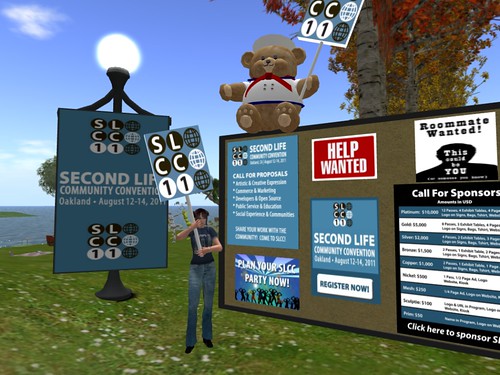
Chimera Cosmos in front of the Help Wanted sign on SLCC11 boards. Â Image courtesy Chimera Cosmos.
I think Kate Miranda on the SLED list best represented those who felt that way when she writes:
Well as I pointed out many times it wasn’t really an SL community conference. It was a US meet-up of some sub-section of SL community members, mainly Americans. […] Please don’t tell me about how it was possible to stream video content inworld and watch the cool kids at the conference. That is NOT participation.
While I often felt there was some element of sour grapes in that position (if I can’t have it, no one should), I think there’s a fair criticism in that calling it SLCC when not everyone could participate equally was a difficult and thorny problem. Â Ideally, in my mind, we’d have had more in-world volunteers to help put on an equally full program of fully in-world events, too. Â Instead of just streaming real life to Second Life, there’d be a full program in BOTH real world and in-world locations, and we’d be able to stream each to the other. Â A truly mixed reality program where it wouldn’t matter which you attended. Â But the sad truth is, we never had enough volunteers or time (see above re: the contract mess) or money to make that happen. Â It could happen though, with more time and more planning, and especially if we weren’t stuck on the name/contract issues.
————————————
So my second question is, and especially to the in-world folks who can’t or don’t plan to ever attend in person: Â If we had an event that had better equality of programming both in-world and out, would you be willing to help organize the in-world piece, and perhaps more importantly, would you be willing to help share the costs of all the tech for the streaming?
————————————
About the Money and the Cost of the Convention
Another issue that only became more problematic over time was the cost of the ticket itself. Â As I described in my original post, at a certain point we entered the “vicious cycle” of declining attendance = higher prices = fewer people could afford to come = higher prices = to infinity. Â That cycle would have to be broken to make any convention or event sustainable.
As Shirley Marquez, one of our most fabulous organizers and track leaders (hugs Shirley!), wrote in a comment on my other post:
When compared to a typical professional convention SLCC was cheap; those things often cost $1000 or more for a full convention pass. But hardly anybody actually pays for a professional convention pass out of their own pocket, and even the people who do (consultants and freelance workers) get to write the amount off their taxes as a business expense. Compared to a typical leisure convention (such as a science fiction convention) SLCC was expensive; a weekend SF convention typically costs $50-60. The fact that business and academic people were the bulk of the attendees is partly because people outside those categories looked at the cost, compared it to other things they might do, and passed.
[…] Dramatically increasing the non-professional attendance level of SLCC would have required a drastic price cut; I think we would have had to find a way to get it under $100 for the weekend. I’m not sure whether there was enough interest in the convention to get the number of attendees necessary to reach that price point, and it’s even more clear that the much larger number of volunteers that would have been needed was not available.
That’s a pretty fair comment and you should read her full comment to see what else she says about how typical fan conventions work and how they get better economies of scale. Â We always hoped for that eventually, too, but for many reasons (including, I’m sorry to keep harping on it, the timing issues with the contract that messed up so many things!) it never happened.
I’m not sure folks had a sense of how the convention finances worked, but I’ll try to explain in broad strokes.  When we started (we as in AvaCon, again, I can’t speak to what happened in the years before with The Future United folks) (er Update:  Read FlipperPA’s comment about writing a $139,000 (!!!) check for SLCC 2007!), we had 0 dollars. Zero.  I paid for the incorporation of AvaCon and all the legal fees and applications for us to start the non-profit out of my own pocket.  Once we got approval and incorporated and chartered and all that legal stuff, we still were not a recognized 501(c)(3) non-profit with the IRS, which meant we were not a tax-exempt organization yet.  We started that process in 2010, and in the irony of all ironies in this situation, I’m very happy to say that our application for non-profit status with the IRS was approved just this spring. But at the time, we didn’t have that status, so we didn’t get non-profit discounts from hotels or any other vendors or services we used.
If you’ve never organized an event before, here’s how it works. Â You have two options, option one, you can hold the event at a non-hotel venue like a convention center or something – and pay rental costs for the space up front, but this does not include any other services or benefits, all of those are a la cart. Â The second option is to hold the event at a hotel where they will give you the “venue” space for free IF you contract with them for a certain number of rooms booked PLUS a certain amount of food and beverages to be purchased by or for your attendees. Â That is, we can use the ballroom and breakout rooms for “free”, but in exchange, we contract with the hotel and guarantee X number of rooms will be rented and X number of food+beverages will be bought by or for our attendees when they come. Â And if they don’t, if fewer people book rooms or eat less food than we thought, then we, AvaCon, have to pay the hotel the difference.
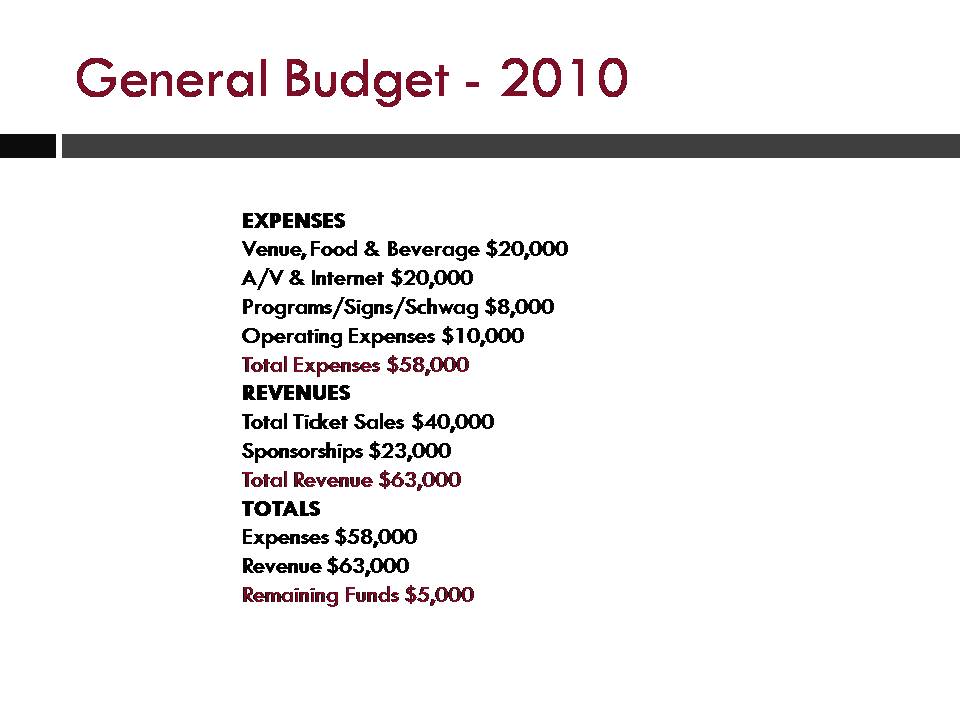
Remember the first year, we had no start-up funds, so, option one, to rent a non-hotel venue, wasn’t an option. Â So we had to go with the hotel option, and try to guess at how many people would show up and how much food we thought they would eat. Â It was pretty scary that first year, we were really taking a gamble that enough people would show up to not bankrupt us in our first year out of the gate.
In general the cost for hotel + some guaranteed amount of “food and beverage” (the plated lunches) is in the $20,0000 – $25,000 range for a 150 – 250 person conference. Â This is pretty much a fixed cost. Â The upside of going the hotel route is that we can then try to negotiate much better room rates for you guys so you at least aren’t paying full cost. Â For example last year, we were able to get the rate down to $109 a night for up to four people in a room (plus free internet!). Â If you got roomates, that’s $25/night and you can’t get much cheaper than that.
But of course the cost of the hotel or venue is not the only cost. The next biggest cost is the tech. Â Hotels often have contracts with internet providers and A/V companies with relatively non-negotiable price lists. Â They charge for every little thing, too, one year we had to pay a ridiculous rental fee for easels! Â (The next year we brought our own darned easels, of course.) Â Because the nature of our convention is very tech heavy and needs high bandwidth internet and lots of A/V support both for the presenters themselves and to stream, record, and mic everything for sound into Second Life, the tech costs are not cheap. Â In general, for the ballroom + breakout rooms for the track presentations, it costs between $10,000 – $20,000 for the technology required to put on the convention, depending on number of break out rooms. Â This is pretty much a fixed cost.Â

Printed Program SLCC 2010.
Both years Lenni Foxtrot donated all of the printing for the custom name badges.
Thank you again Lenni, we <3 you!
Then there are other, smaller costs that add up.  Some of those you might consider to be “extras” and those are the only areas where we had really much discretion at all in choosing how much to spend and what quality, etc. etc.  Those are things like the Tshirts, the printed program, the signage and banners, the lanyards and nametag holders, and all that “stuff” that convention attendees receive as part of attending the conference.  Nearly all of  these items get cheaper in bulk and are one of the few areas where the pricing scales by attendance, in general we spent between $8000 – $10,000 for all of the associated “schwag/signs/printed program/stuff” part of the convention.
The last real cost to putting on the show is the costs of running AvaCon itself.  We have to buy a million dollars in event insurance, we have to pay annual filing fees and other fees for keeping the corporation itself alive, we have web hosting costs, pay an accountant to help with the tax stuff to make sure we’re doing everything right, pay for marketing costs, and the general costs of just doing business.  We also pay ourselves back for our costs in travel and food for the convention.  That was our only monetary compensation, you guys footed the bill for our airfare and food, which, considering the amount of work we put into the conference, I hope you would agree is fair and reasonable.  Our annual operating costs were budgeted to $8000 – $10,000 per year.  This is pretty much a fixed cost.
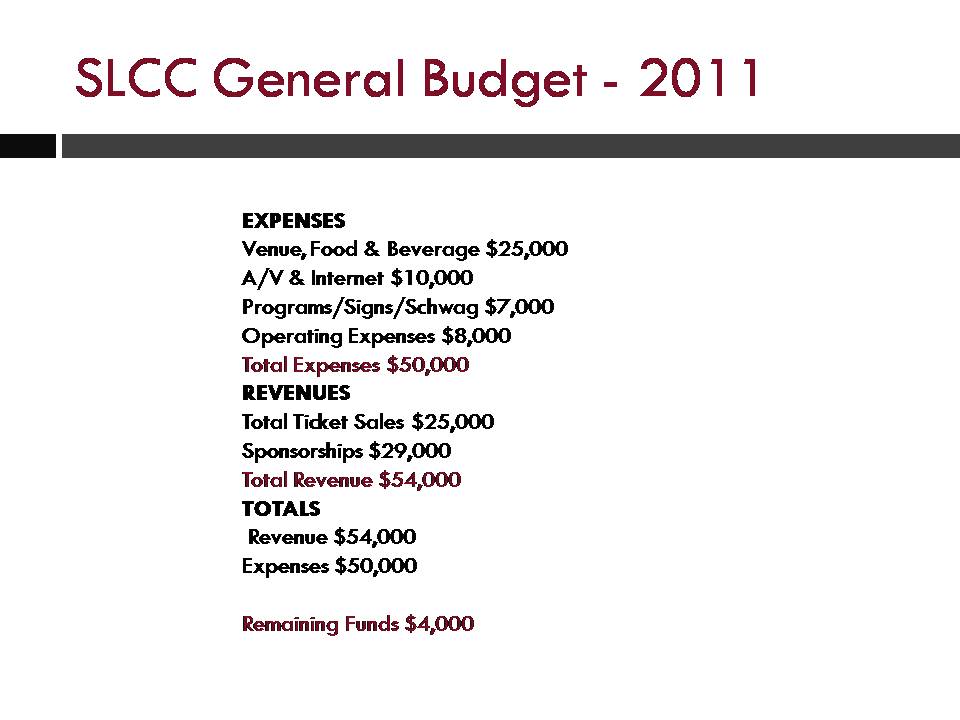
Note which things went up in costs and which things went down in costs compared to 2010 when we had 250 attendees, and 2011 when we had 170 attendees. Â Hotel costs went UP even with fewer people because there weren’t as many people booking rooms! Â This is why we always ask people to stay in the hotel we contract with instead of going somewhere else! Â Also note that A/V costs were halved in 2011 in part because we reduced the number of conference tracks (break-out rooms) to save money.
So add that up and do the math.  Just in basic estimates, it costs about $60,000 to put on a 200-300 person event.  If 200 people show up, that’s $300 for the cost of the ticket.  If 300 people show up, that’s about $200 per ticket.  The more people who come, the lower the ticket price gets, until at some point the scaling math changes and the fixed costs go up another tier. Of course, there are things we can do to lower SOME of those costs, like cheaper bags, single color printing on tshirts, things like that, but that only saves you a little bit here and there.
The only other way to lower the cost of the ticket is to get sponsors or donations or to charge in-world attendees (which we never did) – in general, the more sponsors we get, the more that shaves off your ticket price. Â Every sponsor of the convention also gets some benefits for sponsoring, which also costs money, so for example ad space in the program costs money – each full color printed page costs about $100 (if I remember right), so a $500 sponsor who gets a 1 page ad, $100 goes to the printing of their add, and $400 goes to lowering your ticket price.
So there you have it, that’s the convention math. Â There’s nothing tricky or shady or sneaky about it, and all the folks who keep saying it’s too expensive must not understand how the real world works. Â There are many variables in the equation, and there are many judgement calls about which things to emphasize or pay a little more for if it raises the quality of the experience enough to justify the cost, and we did our best to be as cost-conscious as possible, but considering the costs that we CANNOT control plus the costs of flights, and food, and etc, we only have so much wriggle room – and we definitely want to be able to deliver the quality of experience people expect.
What sense does it make to pay for an expensive flight to go to a crappy hotel somewhere, with broken or not the right A/V to present or stream, and not even a nice tshirt when you’re done? Â That doesn’t make sense at all, so we tried to strike a reasonable balance between reasonable price for reasonable quality.
————————————
Third question for the audience: Â Would you really prefer to be at a lower scale venue with lower scale tech to make the convention cheaper? Â What if it only lowered the price by $50-$75 or so, since there is some bottom floor of costs for an event of this size?
————————————
AvaCon is Just in this for the Money (or Glory, or Fame, or Because We’re Evil)
I also want to address the (not very nice) comments of Truth Teller, who commented on Inara Pey’s post:
 Anyone who has spoken to any of the AvaCon folks in the last year knows they are and have been planning on starting a new “meteverse†conference that would include not just SL, but ReactionGrid, Unity 3D, and so on because that’s where they think the money is. […]they didn’t want to do the work, or even allow someone else to step in because they had already made other plans. This was a blatant bold face attempt to kill SLCC, in order to give them time to establish and launch their new conference.
First off, to suggest that we are in ANY way “in this for the money” is completely freaking absurd.  You couldn’t pay most people to go through this stress, nevermind that none of us has made a single penny and in fact have paid out of our own pockets for this.  I don’t know who “Truth Teller” is, but if  s/he had ever spent even a millisecond of time with either myself, Joyce, or Kathey – s/he would know none of us are focused on making money at all, we were just trying to break even!!  (I mean seriously, ask Chilbo residents if you don’t believe me, I’m a terrible capitalist.)  My professional hourly rate is about $75/hr, so if you calculate how many hours I spent on SLCC just last year, I GAVE the conference about $30,000 worth of my time – certainly in opportunity cost to make money doing something else.
Second, to suggest that WE killed SLCC is just wrong.  See my previous post.  Lots of things killed SLCC, but primarily Linden Lab did by offering us a contract we just couldn’t accept. Â
Third, to suggest  we made that decision, or the timing of any of this was because we’re lazy or trying to prevent someone else from doing it or any of those kinds of motivations is equally absurd.  We agonized over this.  We probably drove our families and partners crazy, in fact.  The delay in the announcement wasn’t about some secret strategy to kill SLCC, it was about exhaustion, and feeling bad about letting everyone down, and trying to weigh personal and family needs versus the community, and trying to decide if we had it in us to try to forge ahead despite all these problems.  The sad answer in the end was no, but we didn’t wait to tell everyone because we’re greedy jerks, but because we’re only human.  And the fact remains, even if some other group wanted to do it, they’d be dealing with exactly the same kind of issues that we are facing.  Calling us lazy is so off the mark, I can only lol at that.
Fourth, yes we talked about the “metaverse” concept last year, but nothing has been decided and we’re not secretly planning something behind your backs. Â How could we? Â If the last couple years have taught us anything it’s that we can’t do this alone. Â There’s nothing sneaky or malicious in thinking the community might be better served by ditching the “Second Life” name because of the contractual crap that goes along with having it, and uou’d have to be either crazy or living under a rock not to know that Second Life is no longer the exciting hype machine it used to be. Â Things have changed. A lot of the SLCCs you remember were cheaper because there were still corporations and academics and lots of other folks subsidizing the price, but those people are gone. They don’t come anymore, and I don’t think they’d come back even if all the other issues I’ve mentioned went away.
Yes, we asked some folks after the convention last year what they thought about the “metaverse” concept, but that’s because we were already dealing with all of these intractable issues – with the contract and trademark name, with the declining attendance that made the convention math very dicey, and because we genuinely wanted to know what the people who actually come to the convention thought. Â Stop trying to portray that as if we were doing something shifty by acknowledging that things are going to have to change to be sustainable if we want to have a convention at all.
So What Happens Now?
The short answer is: Â I don’t know.
Despite all the rocky stuff I’ve just discussed, I personally am still as committed to AvaCon’s mission as I ever was, and I still feel there is a need, a desire, and an opportunity for the kind of annual convention that many people would all like to see.
We (AvaCon) also have two years of experience we didn’t have before, and AvaCon now has 501(c)(3) non-profit status, which means donations to us are now tax deductible (that was a major showstopper for lots of corporate donations who thought about sponsoring the event but didn’t because of tax reasons), and that makes us eligible for all kinds of discounts, special programs, and price breaks on services that we were not eligible for before, which means we could probably save some substantial money on some of those “fixed” costs.
When we incorporated, the members of AvaCon had “lived” in Second Life for almost the whole time it existed and we believed as strongly in Second Life as it was possible for anyone to believe. Â Some folks still do (though as I said, my personal opinion has changed over time) but the interest is NOT in being anti-Second Life at all, it’s just in trying to figure out what makes sense for an annual convention that is actually affordable, fun, exciting, and interesting for people.
Here’s what I wrote at the end of SLCC 2010:
But more than the logistics, and venue, and schedules, and updating the website and all that .. stuff that goes into making a convention, we were far more worried about something less tangible. Something invisible that it’s harder to put your finger on, that’s hard to even describe – that amorphous “community spirit†that threads through a diverse group of individual people to weave a sense of belonging together, an identity separate from one’s own that makes you feel a part of something larger.  Was the “community†still out there? Did they still want to come together in person, and especially after such a difficult roller coaster ride of a year for the platform?
The question I heard so many times over the last few months as we planned the convention is why, if the virtual world is so powerful, do people want to come together in person in the first place? The answer isn’t so simple, but it has something to do with the fact that those of us living simultaneously in the metaverse and the physical world are living complicated lives.  Life itself has no guidebook, but virtual life has even less of one, and there is something inordinately powerful about being in the presence of hundreds of other pioneers in this space who know on a deep level some of the challenges you yourself have faced.
Second Life is a platform, a technology, a tool.  But it gave us a glimpse of the future, and in one way or another has forced all of us who have immersed ourselves deeply to ask fundamental questions with a new perspective – Who am I? Who is Fleep? Who do I want to be if I can be anything? What is real?  What is virtual? What do all these technological changes mean for the future – for me, for society? And where is this all going, anyway, this platform called Second Life, and this concept we call the metaverse? Is it stalling? Is the vision we shared breaking apart or are we just hitting some stumbling blocks?
My personal goal for SLCC was to provide a space for that conversation to take place. Nothing more, nothing less.
At the end of the day is the convention REALLY about Second Life, or is it about the people? Â I can’t help it that after all these years, and all these experiences with organizing events and communities (NOT just SLCC, also SLBPE/VWBPE, Chilbo, etc. etc.), I’ve come to think that maybe widening the conversation beyond just “Second Life” would help make a large annual gathering more interesting, more financially feasible, and more self-sustaining for all of us.
————————————
So my last question is: Â Would it really be so bad to invite other people to that conversation? Â To invite the Opensim folks and others who might be interested? Â Aren’t we all asking some of the same fundamental questions about what it means to live in our virtual world(s) after all?
————————————
 As I said before, this stuff is all my own opinion and perspective.  I’m not sure what’s going to happen, or what the other organizers think, or what you guys think about what should happen next, but I am trying to help answer questions people have and trying to give the straight scoop on what I think went wrong or didn’t make sense so everyone can learn from our experience and not make the same mistakes again.
Thanks to all for your thoughts and comments, and for so many folks I haven’t talked to in a while who commented and reminded me of very happy memories, lots of xoxoxoxo’s to you. Â 🙂
 A few weeks ago, I took the plunge to change to
A few weeks ago, I took the plunge to change to 